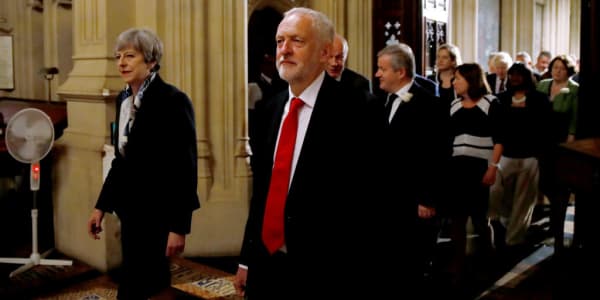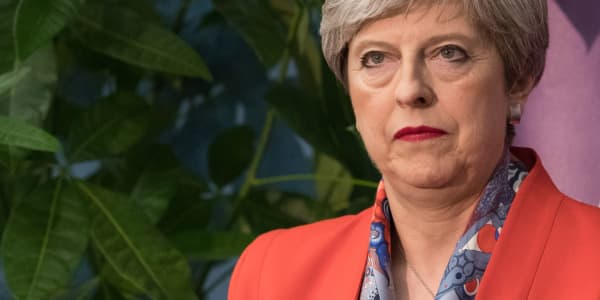Another U.K. General Election is upon us, and while it came quicker than expected, a lot has changed in two years – both politically and digitally.
Since 2015's election, the U.K. has seen a prime minister step down and another take their place, political parties thrown into turmoil, a vote to leave the European Union and tensions rise between the four countries that make up the U.K.
While this election initially expected to see the Conservatives win outright, latest polls indicate this majority is becoming less predictable, therefore last-minute events could have some influence in swaying undecided voters.
One sector that has a degree of influence in politics is that of the media. In previous elections, it's not uncommon for some national newspapers to endorse a party or to hold a particular view. However, in the age of social media and "on the move" mobile news – how influential are newspapers when it comes to political party endorsements?
"Circulation of print papers has declined in most of Western industrialized countries, but I wouldn't infer from that a decline in influence," said Dr. Marco Bastos, lecturer in media and communications at City, University of London, in an email to CNBC.
Bastos gave two reasons for this: one, not all sectors of the news industry have been equally impacted by the drop in print ad revenues, and second, that newspapers' influence is a result of their "structural coupling to the public opinion, a process that surely benefits from broad circulation but that's not restricted to it."
Digital, meanwhile, has greatly advanced in the past decade but at 2015's U.K. election, it appeared online technology had yet to show its full wrath of influence.
According to a 2015 survey of 3,019 people by Panelbase, 62 percent saw TV as being the most influential in informing people about the election, compared to the 17 percent for websites, and 7 percent or less for Facebook, Twitter and other social media platforms. Meanwhile, newspapers had 24 percent influence in informing readers about the election and helping them form opinions on parties, with The Daily Mail being the most influential of those listed, followed by The Guardian and The Times.
"It is true that Conservative voters tend to buy the Mail and the Telegraph, and the Mirror's voters are overwhelmingly Labour party supporters. However, the agenda setting impact of the news media is significant; they may not directly influence your vote, but they certainly set the agenda about what's being talked about," said Tom Felle, lecturer in journalism at City, University of London, to CNBC via email.

'It's The Sun Wot Won It'
How society consumes political news may be showing a greater shift towards digital, yet newspaper political endorsements have still been closely watched – even up until the 2015 election, with one newspaper frequently analyzed.
On April 11 1992, just after the U.K. voted in the 1992 election, – which saw Conservatives secure victory – popular British tabloid The Sun published the headline "It's The Sun Wot Won It". The headline itself referred to The Sun's level of influence in the election's outcome and whether it shaped readers' views, because of its political coverage.
Pollsters and analysts were shocked by the Conservatives' win, as many had forecasted a win by Labour or expected a hung parliament, according to the BBC. In following elections, The Sun went back and forth on which candidate it would support for each election, with future election outcomes reflecting The Sun's endorsement. The headline is often cited by academics and newspapers in relation to how influential – or not – the press is with election results.
The rise of digital
According to 2011-2016 data provided by Euromonitor International, circulation of U.K. newspapers – both daily and non-daily – has declined consistently over the course of the six years, correlating with a decline in print ad-spending. In 2011, circulation of daily newspapers in the UK came in at 13.9 million, while in 2016, it was at 10.8 million.
Meanwhile, ad spending in TV, radio and online have all increased since 2011 according to the data, highlighting the media and the reader's shift towards digital consumption.
Yet does this mean media firms should shift their political endorsements more towards online?
"There is no question that digital and social media is an important part of editorial strategies for media organizations, but political endorsements are to a certain extent uncharted territory for news organizations online, they could backfire with negative sentiment on social media," said Felle, adding that he believed news groups would probably "tread carefully" in this field.
Bastos meanwhile noted that while the demographics of print readership may vary to that of online, firms who hold a certain editorial stance on politics are likely to be expected to push this subject matter out on a number of its distribution platforms.
Engaging the public going forward
With elections highlighting the melting pot of political views found within a country, a role that news groups can take on - when engaging the public - is to inform citizens of each party's proposals, and analyze what the benefits, disadvantages and facts are of each party's manifesto, to generate debate and discussion.
When it comes to endorsing a certain party, a newspaper is at risk of potentially alienating readers who don't stand by the views given, Felle said.
Meanwhile, both lecturers saw that an unexpected political endorsement by a newspaper would be seen as a way of standing out to the public. For instance in 2016, USA Today – who despite not taking sides in presidential elections during its 34-year history – said that candidate Donald Trump was "unfit for the presidency".
Whether a news organization chooses to remain impartial or be vocal on who it supports, in either case, both types of groups are "simply trying to strike a balance between their core values and the expectations of their readerships" said Bastos.
While Felle told CNBC that it's fair to say that newspapers have lost some influence as more new platforms emerge, if even a small group of citizens can be swayed, print endorsements still have an impact.
"The reality is that elections are often won by just a handful of votes in each ballot box. If even only a tiny percentage of people are swayed, then newspaper endorsements still have influence," said Felle.
"In terms of social media, I think there is a much greater chance that the public are influenced by social media, but they don't see it as media, they see it as a place where they are entertained, and they are influenced by what they friends like and share."





